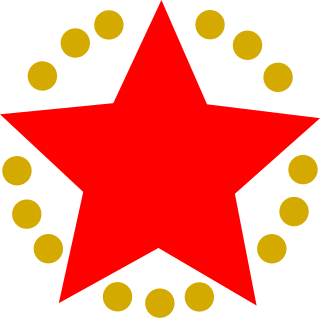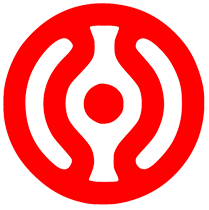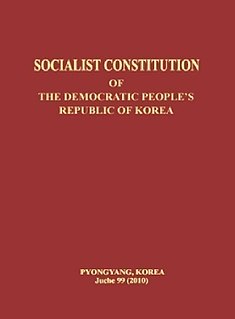
The Supreme People's Assembly is the unicameral legislature of the Democratic People's Republic of Korea (DPRK), commonly known as North Korea. It consists of one deputy from each of the DPRK's 687 constituencies, elected to five-year terms.

The Chondoist Chongu Party is a popular front party in North Korea. The party was founded on 8 February 1946 by a group of followers of the Ch'ŏndogyo. The party increasingly came under the influence of the government over time and is a part of the Democratic Front for the Reunification of Korea, a nominal alliance of parties dominated by the ruling Workers' Party of Korea. The founding-leader of the party was Kim Tarhyon.

Choe Yong-gon was the Supreme Commander of the Korean People's Army from 1948 to 1950, North Korean defence minister from 1948 to 1957, and the Chairman of the Standing Committee of the Supreme People's Assembly of North Korea from 1957 to 1972.

The Socialist Constitution of the Democratic People's Republic of Korea is the constitution of North Korea. It was approved by the 6th Supreme People's Assembly at its first session on 27 December 1972, and has been amended and supplemented in 1998, 2009, 2012, 2013, 2016 and twice in 2019. It replaced the country's first constitution which was approved in 1948.

The President of the State Affairs Commission of the Democratic People's Republic of Korea, previously referred to as the Chairman of the State Affairs Commission, is the head of state of North Korea. The President heads the State Affairs Commission (SAC), which is the highest leadership institution in North Korea, and serves as the commander-in-chief of the North Korean armed forces.

The 6th Central Committee of the Workers' Party of Korea was elected by the 6th Congress on 14 October 1980, and remained in session until the election of the 7th Central Committee on 9 May 2016. The Central Committee composition was replenished by the 3rd WPK Conference. In between party congresses and specially convened conferences the Central Committee is the highest decision-making institution in the WPK and North Korea. The Central Committee is not a permanent institution and delegates day-to-day work to elected bodies, such as the Presidium, the Politburo, the Secretariat, the Central Military Commission and the Control Commission in the case of the 6th Central Committee. It convenes meetings, known as "Plenary Session of the [term] Central Committee", to discuss major policies. Only full members have the right to vote, but if a full member cannot attend a plenary session, the person's spot is taken over by an alternate. Plenary session can also be attended by non-members, such meetings are known as "Enlarged Plenary Session", to participate in the committee's discussions.
The Ministry of Finance is a government ministry in North Korea which is responsible for planning and managing the economic policies of the Democratic People's Republic of Korea. It deliberates the budget, establishes tax and economy policies, establishes fiscal policies and national financial management plans, organizes budgets, and discusses plans for fund management. It is a department in charge of coordination, budget and fund execution and management. It was formed in September 1948.

The 7th Standing Committee of the Supreme People's Assembly (SPA) was elected by the 1st Session of the 7th Supreme People's Assembly on 5 April 1982. It was replaced on 30 December 1986 by the 8th SPA Standing Committee.

The 8th Standing Committee of the Supreme People's Assembly (SPA) was elected by the 1st Session of the 8th Supreme People's Assembly on 30 December 1986. It was replaced on 26 May 1990 by the 9th SPA Standing Committee.

The 9th Standing Committee of the Supreme People's Assembly (SPA) was elected by the 1st Session of the 9th Supreme People's Assembly on 26 May 1990. It was replaced on 6 September 1998 by the 10th SPA Presidium.

The committees of the 9th Supreme People's Assembly were elected by the 1st Session of the 9th SPA on 26 May 1990. They were replaced on 6 September 1998 by the committees of the 10th Supreme People's Assembly.

The 6th Standing Committee of the Supreme People's Assembly (SPA) was elected by the 1st Session of the 6th Supreme People's Assembly on 17 December 1977. It was replaced on 5 April 1982 by the 7th SPA Standing Committee.

The committees of the 6th Supreme People's Assembly (SPA) of North Korea were elected by the 1st Session of the aforementioned body on 17 December 1977. It was replaced on 5 April 1982 by the committees of the 7th Supreme People's Assembly.

The committees of the 7th Supreme People's Assembly (SPA) of North Korea were elected by the 1st Session of the aforementioned body on 5 April 1982. It was replaced on 30 December 1986 by the committees of the 8th Supreme People's Assembly.

The 6th Central People's Committee (CPC) of North Korea was elected by the 1st Session of the 6th Supreme People's Assembly on 17 December 1977. It was replaced on 5 April 1982 by the 7th CPC.

The 7th Central People's Committee (CPC) of North Korea was elected by the 1st Session of the 7th Supreme People's Assembly on 5 April 1982. It was replaced on 30 December 1986 by the 8th CPC.

The 8th Central People's Committee (CPC) of North Korea was elected by the 1st Session of the 8th Supreme People's Assembly on 30 December 1986. It was replaced on 26 May 1990 by the 9th CPC.

The 9th Central People's Committee (CPC) of North Korea was elected by the 1st Session of the 8th Supreme People's Assembly on 26 May 1990. The CPC was abolished and replaced on 6 September 1998 by the 10th National Defence Commission.

The 9th National Defence Commission (NDC) of North Korea was appointed by the 9th Central People's Committee in its 1st Session. It was replaced on 6 September 1998 by the 11th NDC.

The 7th th Supreme People's Assembly (SPA) was elected on 28 February 1982 and convened for its first session on 5 April 1982. It was replaced in 1986 by the 8th Supreme People's Assembly.







